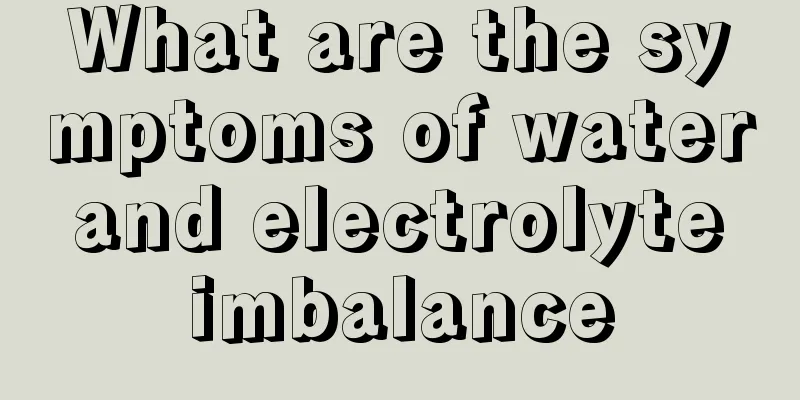What are the symptoms of water and electrolyte imbalance

|
Water and electrolyte disorders often manifest as hypernatremia, hyponatremia, and hyperkalemia. These diseases and problems can easily have adverse effects on human health, leading to symptoms such as headaches, dizziness, nausea, vomiting, and chest tightness. 1. Hypernatremia The clinical manifestations are atypical and fatigue may occur. Dry lips and tongue, loss of skin elasticity, irritability, and even mania, hallucinations, delirium and coma. Brain atrophy caused by hypernatremia may be followed by cerebral hemorrhage, subarachnoid hemorrhage, and even death. 2. Hyponatremia Mild hyponatremia (serum sodium concentration 120-135mmol/L) may cause loss of taste and muscle aches; moderate hyponatremia (serum sodium concentration 115-120mmol/L) may cause headache, personality changes, nausea, vomiting, etc.; severe hyponatremia (serum sodium concentration <115mmol/L) may cause coma and loss of reflexes. 3. Hyperkalemia It manifests in three aspects: ① Severe physical symptoms such as bradycardia, atrioventricular block and even sinus arrest. The electrocardiogram shows tall and sharp T waves. In severe cases, the PR interval is prolonged, the P wave disappears, the QRS wave widens, and eventually the heart stops beating. In the early stage, the blood pressure increases slightly, and in the later stage, the blood pressure decreases, and there are irregular breathing and arrhythmias. ② Neuromuscular symptoms manifest in the early stages as muscle pain and weakness, and when the symptoms are most severe in the extremities, respiratory muscle paralysis may occur. ③ Early manifestations of mental symptoms include apathy, slow response to the outside world, excitement, emotional instability, restlessness, etc. In severe cases, there will be impaired consciousness, drowsiness, coma, etc. 4. Hypokalemia It is not only related to the concentration of serum potassium, but also closely related to the speed of hypokalemia. Therefore, in patients with slow onset, although hypokalemia is severe, the clinical symptoms may not be obvious. On the contrary, in patients with acute onset, although hypokalemia is not severe, the clinical symptoms may be very significant: ① Physical symptoms include lack of appetite, abdominal distension, thirst, nausea, vomiting, chest tightness, palpitations, and severe myocardial involvement, which can lead to heart failure. The initial electrocardiogram shows flat or absent T waves and the appearance of U waves. In severe cases, ventricular tachycardia, ventricular fibrillation or sudden death may occur. ② Neuromuscular symptoms are the most prominent symptoms of hypokalemia, and the important manifestations are decreased muscle strength and weakness in the limbs, flaccid paralysis and periodic paralysis. ③ Early manifestations of mental symptoms include fatigue, emotional indifference, memory loss, depression, and stupor. In severe cases, there may be impaired consciousness, drowsiness, delirium and even coma. 5. Hypercalcemia Slow reaction, indifference to the outside world, emotional indifference and memory impairment; there may also be symptoms such as hallucinations, delusions, depression, etc.; in severe cases, there may be consciousness disorders such as drowsiness and coma. |
<<: What to do if acid-base imbalance occurs
>>: What kind of people are prone to altitude sickness?
Recommend
Red spots on eyelids
Red spots on the eyelids do not necessarily mean ...
What is the chance of curing benign brain cancer?
It is a pity to suffer from brain tumors, because...
Will real honey crystallize? The truth is this
Will honey crystallize? The truth is this In rece...
Can liver cancer patients eat lobster? Liver cancer patients should mainly eat these foods
Liver cancer patients must not eat lobsters, as l...
Can I exercise after bone cancer surgery
Bone tumors are tumors that occur in bones or the...
Papular dermatitis
This situation often happens in our daily life. S...
Drink honey vinegar water to lose weight
The vast majority of people who want to lose weig...
What are the dietary taboos for melanoma
In people's lives, diet is absolutely indispe...
How to divorce when the relationship between husband and wife breaks down?
If you want to maintain a complete family, the hu...
Inflammation of the groin muscles
The groin is the area where the thigh and abdomen...
What are the side effects of rabies vaccine
We all have a fear of rabies. Once the disease br...
Which department should I go to for a swollen neck
In fact, when there are major problems with the n...
Where does hair algae grow
Hair moss is a dish that people may eat in daily ...
The efficacy and function of walnut shell
Everyone has eaten walnuts, and we all know that ...
How many bottles of yogurt can I drink a day?
Many foods in people's lives are beneficial t...









